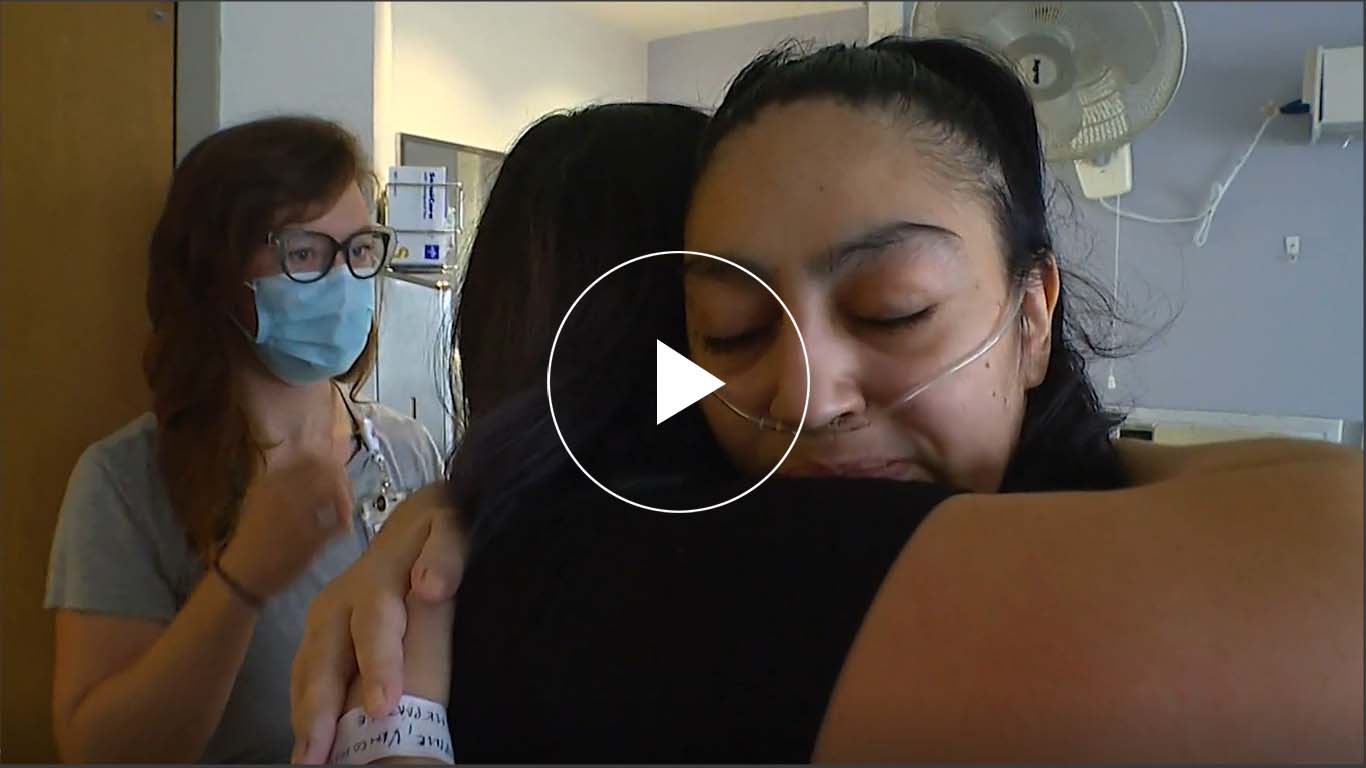When Jenny Aguilar, age 32, walked out of critical care at UW Medical Center – Montlake after six months, her doctor said it was the highlight of her career.
Aguilar, a mom of five, began experiencing COVID-19 symptoms not long after celebrating Christmas. She was admitted to urgent care in her hometown of Reno, Nevada. The next thing she recalls is waking up in Seattle.
As her health deteriorated, her care team called hospitals up and down the West Coast that had ECMO programs. An ECMO machine takes over when a patient’s heart and lungs fail. The program to run and operate ECMO machines is extensive and expensive, requiring a full team of trained doctors, nurses, respiratory therapists, perfusionists and others.
Harborview Medical Center, which has the capacity to accommodate up to four ECMO patients, was the first place with an opening. However, transporting Aguilar proved to be another challenge. She couldn’t be flown on her back, which is standard procedure, since this caused her oxygen levels to dip dangerously low. So, Airlift Northwest, UW Medicine’s premier air critical care transport service, used their ingenuity to draft a new protocol for flying people prone. They successfully used it for the first time with Aguilar.
That’s when Aguilar came under the care of Jenelle Badulak, MD, assistant professor of emergency medicine. She was just one person on Aguilar’s team of doctors, nurses, respiratory therapists, perfusionists and others who worked around the clock to keep Jenny alive and restore her health.
It wasn’t long after arriving at Harborview that Aguilar’s heart began to fail, so she was moved to UW Medical Center – Montlake, which specializes in cardiac support.
The biggest challenge and question, says Badulak, was knowing if they were doing the right thing. Typically, a patient is on ECMO for two to four weeks. Aguilar was on it for four months — the longest run ever in the hospital’s history.
Meanwhile the demand for ECMO treatment in the middle of a pandemic remained high, forcing her care team to make a difficult decision. “If we kept Aguilar on ECMO for months, that has major ramifications for other patients who weren’t going to get this treatment. It was really challenging figuring out what to do, especially not knowing her chances of survival if we kept going,” says Badulak.
But there was some data that showed other centers were having successful long runs with patients, so her care team decided to try. Aguilar’s path to recovery wasn’t linear; there were plenty of setbacks. However, when the team took a step back, they could see her arc of recovery. She was slowly getting better. When she finally re-gained consciousness, her care team told her she had a tough road ahead, but they thought she had a chance of surviving.
Everyone on her team felt her will to live. “She’s one of the toughest people I’ve ever delivered care to. She’s just determined, and I think a lot of that was her motherhood,” says Badulak. “When Jenny could talk again, she just kept saying, ‘No one will love my children like I will.’”
Aguilar’s journey was in many ways a learning experience. Her care team learned that long runs on ECMO could lead to recovery for severely damaged lungs, and that the lungs, much like the kidney, may take extensive time to heal, but it’s possible. They also felt the emotional pain and mental anguish that comes with having to decide who gets treatment and who doesn’t.
In the end, no one disputes that Aguilar’s long journey was worth it. “A lot of the time, if someone is in the ICU for four months, they don’t go home. They go to a facility or something,” says Badulak. But Aguilar walked out of her hospital room to applause, cheers and many tears from her care team.
The expertise, technology and training that kept Aguilar alive are a significant, long-term investment that depend on donor support. UW Medicine care teams like Aguilar’s work tirelessly to deliver the most innovative, compassionate care to everyone in our community, regardless of income or insurance status.
“ECMO is expensive because it takes a massive amount of people to run a successful program… so we need help from the community to keep this vital program going and make it sustainable,” says Badulak.
Written by Eleanor Licata

